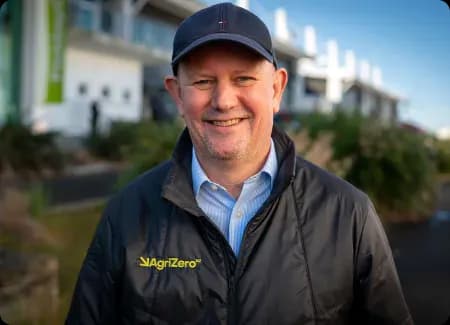27 August 2024
AgriZeroNZ is investing a further NZD $4 million in Ruminant BioTech, to accelerate the commercialisation of a methane-inhibiting bolus specifically suited to New Zealand’s pastoral farming system.
The slow-release, biodegradable bolus sits in the animal’s rumen, releasing a controlled dose of a methane inhibitor for up to six months.
The latest trial on cattle demonstrated impressive results, showing a 75% daily methane reduction for 100 days from a single treatment.
AgriZeroNZ chief executive Wayne McNee, says the public-private joint venture is pleased to boost its investment in the Kiwi scale up, after an initial investment of NZD $1.8 million in April 2023.

Wayne McNee
“Ruminant BioTech is proving its technology is working – on animals and in New Zealand, so we’re pleased to make this further investment to accelerate the development of a pasture-based solution for Kiwi farmers.
“The bolus has demonstrated world-leading results for methane reduction in a pastoral system in its latest animal trial, and we look forward to supporting the team to make their emissions reduction tool available to farmers.”
Ruminant BioTech is working with MPI on full product registration to enable the methane-inhibiting bolus to be used on New Zealand farms.
Ruminant BioTech CEO, Tom Breen, says the company aims to be treating over 30 million cattle annually by 2030 and envisages this increasing to 100 million cattle within the next 10 years.
“This additional funding from AgriZeroNZ will help us accelerate our product and market development programme and build our first manufacturing plant in New Zealand to bring the product to market in late 2025, starting in Australia and followed by New Zealand, subject to regulatory approvals.”
McNee says the bolus could be a game-changing tool to help farmers reduce emissions without changing farming practices.
Wayne McNee, AgriZeroNZ chief executive
“It has the potential to be suitable for all ruminant animals, and due to its low touch nature, it’s also a viable option for the likes of beef farmers who don’t need to interact with their animals daily.”
McNee says AgriZeroNZ has committed more than $34 million across a range of emissions reduction tools and technologies for New Zealand farmers including novel probiotics, low methane pasture and methane vaccines.
“There isn’t going to be a one-size-fits-all approach when it comes to reducing emissions across our agricultural sector, so we’re investing in a range of different tools to give us the best chance of providing our farmers with access to affordable, effective solutions,” McNee says.